We may not have the course you’re looking for. If you enquire or give us a call on 01344203999 and speak to our training experts, we may still be able to help with your training requirements.
Training Outcomes Within Your Budget!
We ensure quality, budget-alignment, and timely delivery by our expert instructors.
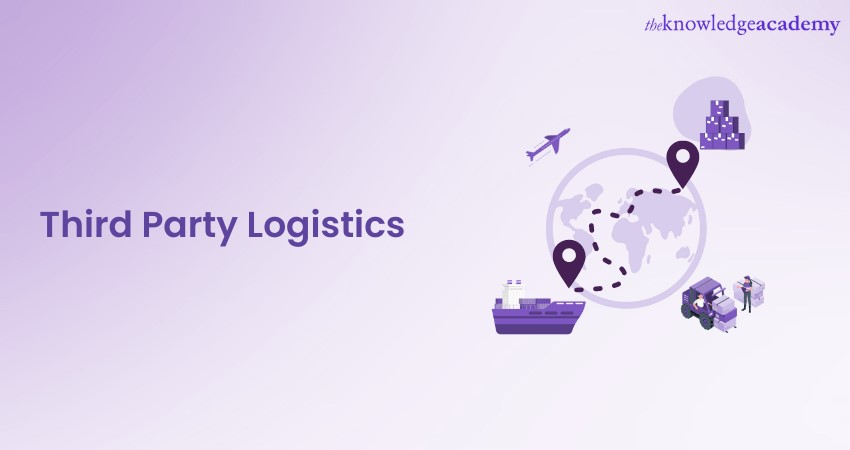
In an era of globalisation, intricate supply chains, and heightened customer expectations, "Third Party Logistics" is a crucial driver of operational efficiency and business success. As companies strive to navigate the intricate landscape of modern commerce, Third Party Logistics has garnered remarkable significance.
Third Party Logistics (3PL) stands as a beacon of innovation and collaboration. Simply put, it refers to the strategic partnership between organisations and external logistics experts who specialise in managing multiple aspects of the supply chain. In this blog, we will learn about Third Party Logistics and gain clarity on various aspects surrounding it. Read more to find out!
Table of Contents
1) What is Third Party Logistics?
2) Benefits of using Third Party Logistics
3) Types of Third Party Logistics providers
4) How to choose the right Third Party Logistics provider?
5) Implementing Third Party Logistics solutions
6) Challenges and risks of Third Party Logistics
7) Conclusion
What is Third Party Logistics?
In modern supply chains, where efficiency, accuracy, and adaptability are paramount, the term 3PL takes centre stage. At its core, Third Party Logistics represents a strategic collaboration between companies and external experts specialising in handling various aspects of the supply chain. This symbiotic relationship enables businesses to offload specific logistical functions, thereby optimising operations and focusing their energies on core competencies. Within 3PL, a range of services and solutions is offered, each contributing to the intricate orchestration of a seamless supply chain.
Components of Third Party Logistics services
Under the expansive umbrella of 3PL, an array of services come together to streamline the supply chain. These services encompass but are not limited to transportation, warehousing, distribution, inventory management, order fulfilment, and customs clearance. These facets represent a vital logistical puzzle that 3PL providers adeptly manage.
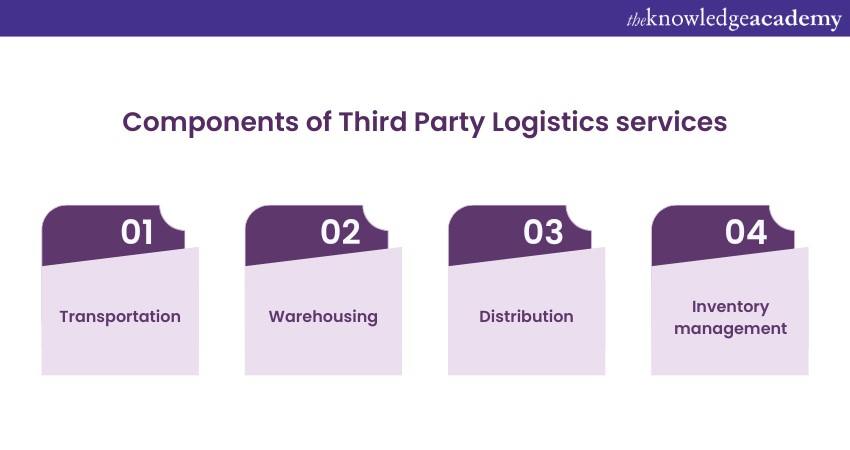
Distinguishing Third Party Logistics from traditional Logistics
It's imperative to differentiate between traditional in-house logistics and the paradigm of Third Party Logistics. While standard logistics involves internal management of the entire supply chain, 3PL involves outsourcing specific functions to specialised external providers. This strategic partnership offers many advantages, including expertise, cost-effectiveness, and scalability.
Flexibility and adaptability in 3PL
One of the defining features of 3PL lies in its adaptability. In a dynamic business environment, where market demands can shift overnight, 3PL providers bring flexibility that's difficult to replicate in-house. They can adjust transportation routes, warehousing capacities, and distribution strategies to match the market's ever-changing needs.
Global reach and cross-border Logistics
With the rise of international trade, cross-border logistics has become a critical aspect of modern supply chains. 3PL providers often specialise in navigating the complexities of global trade regulations, customs procedures, and efficient cross-border transportation. This expertise is indispensable for companies seeking to expand their reach across borders.
Technological integration in 3PL
The digital age has introduced a new era of logistics, with technology playing a pivotal role. 3PL providers leverage cutting-edge software, data analytics, and tracking systems to enhance visibility, optimise routes, manage inventory, and provide real-time updates to clients. Technology integration empowers businesses with the information needed to make informed decisions.
Benefits of using Third Party Logistics
In modern business practice, where agility and precision are supreme, using Third Party Logistics emerges as a strategic approach for companies of all sizes. This section dives into the benefits that businesses can reap by harnessing the prowess of Third Party Logistics providers, showcasing how this collaborative approach can revolutionise supply chain management and drive unparalleled operational efficiency.
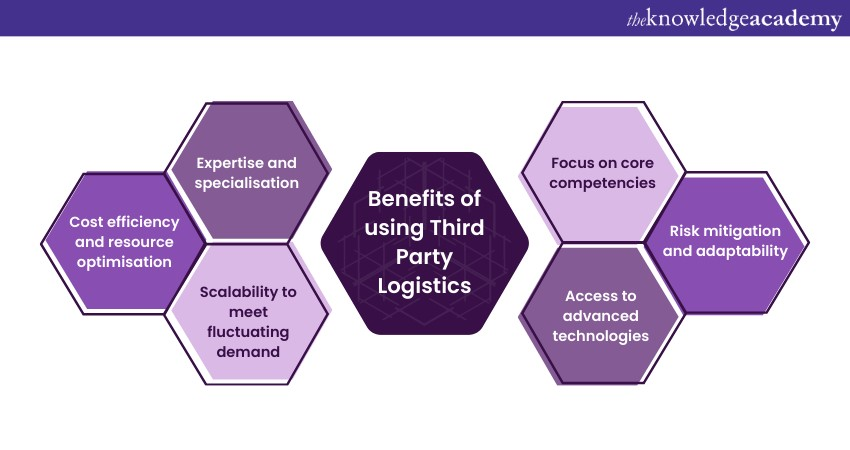
Cost efficiency and resource optimisation
In an era characterised by razor-thin profit margins and the perpetual quest for cost reduction, 3PL presents a compelling solution. By outsourcing logistical functions to specialised providers, companies can eliminate the need for heavy investments in infrastructure, transportation fleets, and warehouse spaces. This shift from fixed to variable costs allows organisations to channel their resources into core activities, optimising their financial outlay.
Expertise and specialisation
Third Party Logistics providers are seasoned experts in their respective domains. Whether navigating complex customs regulations, orchestrating intricate warehousing systems, or optimising transportation routes, their specialised knowledge translates into streamlined operations. Leveraging this expertise enables companies to benefit from best practices without developing in-house competencies.
Scalability to meet fluctuating demand
Market demands are seldom constant; they ebb and flow with the tides of consumer behaviour and economic shifts. 3PL offers a scalable solution that accommodates these fluctuations seamlessly. When demand surges, 3PL providers can quickly scale up warehousing space, transportation capacity, and distribution networks. Conversely, resources can be scaled back during quieter periods, preventing overextension.
Focus on core competencies
Businesses thrive by directing their energies towards their unique value propositions. By outsourcing logistical functions to 3PL providers, companies can concentrate on refining and enhancing their core competencies. This laser-focused approach results in innovation and differentiation, setting them apart in competitive markets.
Risk mitigation and adaptability
Logistics is rife with potential risks—supply chain disruptions, market volatility, and regulatory changes, to name a few. 3PL providers can mitigate these risks through industry insights, global networks, and contingency planning. Their ability to pivot swiftly in response to disruptions ensures continuity even in the face of unforeseen challenges.
Access to advanced technologies
The technology-driven evolution of logistics is a hallmark of the modern era. 3PL providers often invest in cutting-edge technologies such as real-time tracking systems, inventory management software, and data analytics tools. By partnering with these providers, businesses gain access to these advanced technologies without the burden of developing or maintaining them in-house.
Enhanced customer satisfaction
Customer satisfaction depends on timely and accurate deliveries. 3PL providers optimise distribution networks, ensuring products reach customers swiftly and in pristine condition. This level of efficiency contributes to elevated customer experiences and bolsters brand loyalty.
Global reach and market expansion
Navigating international logistics can be daunting for companies eyeing global expansion. 3PL providers possess the knowledge and networks to manage cross-border operations seamlessly. They understand the nuances of international shipping, customs clearance, and compliance, enabling businesses to tap into new markets confidently.
Time-to-market acceleration
The speed at which a product reaches the market most often determines its success. 3PL providers expedite the supply chain by optimising processes, minimising delays, and leveraging efficient transportation networks. This acceleration enables businesses to seize market opportunities swiftly and maintain a competitive edge.
Focus on sustainable practices
Sustainability has become a pivotal concern for businesses worldwide. 3PL providers, attuned to the environmental impact of logistics, can assist in designing eco-friendly supply chain solutions. This collaboration enables companies to reduce their carbon footprint, enhance their reputation, and align with the growing demand for sustainable practices.
Gain skills in popular fields including phone repair, coffee brewing and floristry, sign up for our Industry Training now!
Types of Third Party Logistics providers
In modern supply chain management, the space is populated by an array of specialised entities, each contributing a unique piece to the logistical puzzle. These entities, collectively called Third Party Logistics providers, are the backbone of seamless and efficient supply chain operations. This section unravels the diversity of 3PL providers, shedding light on their distinct roles, functions, and contributions. Let us look at Third Party Logistics examples in this section:
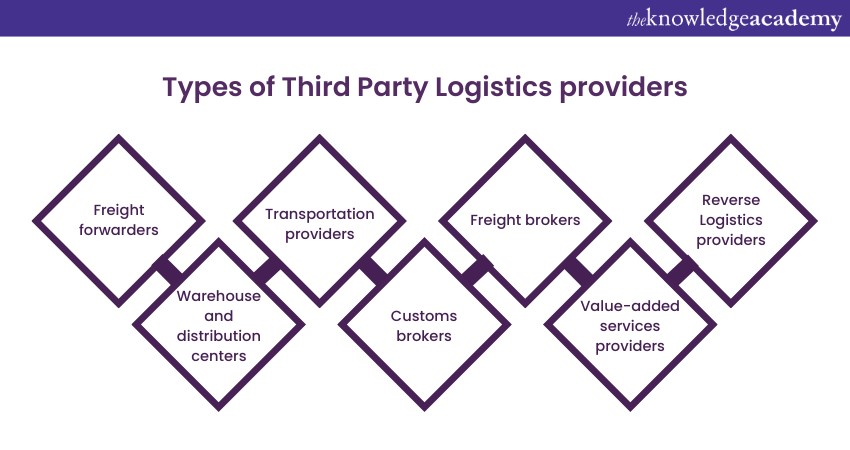
Freight forwarders
Facilitating global movement, freight forwarders act as mediators between shippers and carriers, coordinating the intricate process of shipping goods from one location to another. They navigate complex customs regulations, manage documentation, optimise transportation routes, and ensure that goods reach their destination efficiently. These providers excel at handling international logistics, making them indispensable for businesses engaged in global trade.
Warehouse and distribution centres
Efficient storage and disbursement warehouse and distribution centres form the cornerstone of inventory management and order fulfilment. They offer storage solutions for goods, manage inventory levels, and coordinate the timely dispatch of products to end consumers. These providers optimise warehouse layouts, implement inventory tracking systems, and streamline the movement of goods within the facility.
Transportation providers
Seamless movement of goods transportation providers encompasses a range of modes, including trucking, air freight, ocean freight, and rail transport. Their expertise ensures the smooth transit of goods from origin to destination. They optimise transportation routes, manage carrier relationships, and ensure timely deliveries, making them essential for companies seeking efficient and reliable movement of their products.
Customs brokers
Navigating international regulations, customs brokers specialise in the intricate world of customs regulations and trade compliance. They facilitate the seamless movement of goods across international borders by managing documentation, tariffs, duties, and compliance requirements. Their deep understanding of international trade laws ensures that shipments clear customs without delays or complications.
Freight brokers
Matching shippers with carriers' freight, brokers act as mediators between shippers and carriers, connecting companies needing transportation services with available carriers. They negotiate rates, secure capacity, and manage the logistics of arranging transportation. Freight brokers are pivotal in optimising transportation costs and finding the most suitable carriers for specific shipments.
Value-added services providers
Enhancing Product Offerings Value-added service providers go beyond the conventional scope of logistics by offering additional services that enhance the value of products. These services include packaging, labelling, kitting, assembly, and customisation By outsourcing these tasks to value-added service providers, companies can offer tailored solutions to their customers without diverting their resources.
Reverse Logistics providers
Managing returns and repairs, reverse logistics providers specialise in managing the flow of goods from end consumers back to the manufacturer or retailer. They handle processes such as returns, repairs, recycling, and refurbishment. These providers ensure that the reverse supply chain is as efficient and optimised as the forward supply chain, minimising waste and maximising asset recovery.
Gain skills to handle operational management of the Supply Chain, sign up for our Supply Chain Management Training now!
How to choose the right Third Party Logistics provider?
In Third Party Logistics, where the choice of provider can significantly impact supply chain efficiency and business success, the selection process becomes a strategic endeavour. Choosing the right 3PL provider involves careful consideration, thorough research, and a keen understanding of your company's unique needs. This section focuses on the critical steps and factors that should guide your decision-making to ensure a seamless and productive partnership with the ideal 3PL provider.
Assessing your needs
Selecting the right 3PL provider is to conduct a comprehensive assessment of your company's logistical requirements. Identify the specific functions and services you wish to outsource, such as transportation, warehousing, or order fulfilment. Analyse your current pain points, anticipated growth, and geographic scope to understand your needs clearly.
Researching potential providers
Once you clearly understand your needs, conduct thorough research to identify potential 3PL providers. Utilise online resources, industry directories, and recommendations from peers to create a list of reputable providers. Consider factors such as their experience, industry reputation, and the range of services they offer.
Checking references and reviews
A provider's track record and reputation are critical performance indicators. Reach out to references provided by the 3PL providers and inquire about their experiences. Search for online reviews and testimonials from other businesses that have worked with the providers. This feedback can offer valuable insights into the provider's strengths and potential shortcomings.
Evaluating technological capabilities
Technology is pivotal in optimising operations in the modern logistics landscape. Evaluate the technological capabilities of potential 3PL providers. Inquire about their software systems, tracking capabilities, real-time visibility, and data analytics tools. A provider that leverages advanced technology can offer enhanced visibility and efficiency throughout the supply chain.
Consideration of scalability
Your logistical needs may evolve as your business grows. Choose a 3PL provider that can scale its services to match your growth trajectory. Inquire about their ability to handle increased volumes, adapt to changing demands, and expand into new markets seamlessly.
Communication and collaboration
Effective communication is paramount in a successful 3PL partnership. Assess the provider's communication practices and willingness to collaborate closely with your team. Clear communication channels, responsive support, and a shared commitment to achieving your business goals are crucial aspects of a productive partnership.
Comparing costs and value
While cost is an important consideration, it's equally vital to assess the value offered by a 3PL provider. Compare the costs against the range of services, expertise, technology, and support they provide. A provider that offers balanced competitive pricing and high-value services can deliver long-term benefits.
Alignment with company culture and values
A 3PL provider becomes an extension of your business, so cultural alignment is essential. Evaluate whether the provider's values, approach to business, and commitment to quality align with your company's ethos. This alignment can foster a smoother collaboration and minimise potential conflicts.
Implementing Third Party Logistics solutions
Integrating Third Party Logistics (3PL) solutions into your business operations marks a pivotal moment in your supply chain management strategy. Effective implementation of 3PL solutions requires careful planning, seamless integration, and ongoing collaboration. This section explores the key steps and considerations in successfully implementing 3PL solutions to ensure a harmonious partnership that enhances efficiency and drives business growth.
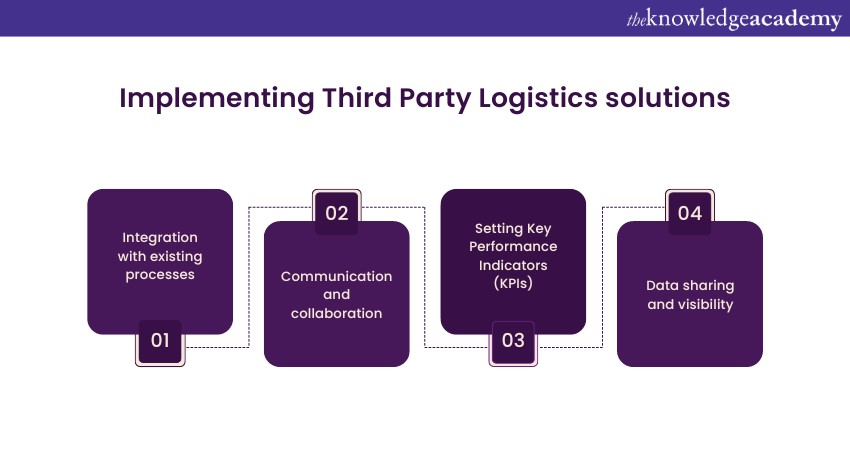
Integration with existing processes
Before implementing 3PL solutions, aligning these new processes with your current operations is crucial. Identify points of integration, such as data exchange, communication channels, and order fulfilment procedures. Collaborate closely with your chosen 3PL provider to seamlessly merge your internal workflows and their logistical systems.
Communication and collaboration
Effective communication forms the bedrock of a successful 3PL implementation. Establish clear lines of communication between your team and the 3PL provider's representatives. Regularly share information, expectations, and updates to ensure everyone is on the same page and any issues are promptly addressed.
Setting Key Performance Indicators (KPIs)
Defining and setting measurable KPIs is essential for tracking the effectiveness of your 3PL solutions. Collaborate with your provider to establish KPIs that align with your business objectives, such as on-time delivery rates, inventory accuracy, and order processing times. Regularly review these metrics to gauge the success of the partnership.
Data sharing and visibility
Data is the lifeblood of modern logistics, and data sharing is a cornerstone of successful 3PL integration. Implement data-sharing protocols that ensure real-time visibility into inventory levels, order status, and transportation updates. This transparency empowers both parties to make informed decisions and respond promptly to changes.
Training and onboarding
Ensure that your team is well-versed in the new processes introduced by the 3PL solutions. Provide comprehensive training and onboarding sessions to familiarise employees with the provider's systems, communication channels, and procedures. A well-trained team can maximise the benefits of the partnership and prevent disruptions.
Change management
Implementing 3PL solutions may necessitate changes to established processes and workflows. Effective change management involves identifying potential resistance, addressing concerns, and communicating the benefits of the new solutions to your team. A smooth transition is essential for minimising disruptions and maintaining productivity.
Performance review and continuous improvement
Regularly review the performance of the implemented 3PL solutions against the established KPIs. Analyse the data, identify areas for improvement, and collaborate with your provider to implement enhancements. Continuous improvement fosters an agile supply chain that adapts to evolving market dynamics.
Adapting to feedback
Feedback from your team and the 3PL provider is valuable for refining the implementation. Foster an environment where constructive feedback is encouraged and embraced. Address concerns, optimise processes, and iterate on the partnership to ensure it aligns with your evolving needs.
Challenges and risks of Third Party Logistics
While Third Party Logistics (3PL) solutions offer many benefits, they also come with their fair share of challenges and inherent risks that businesses must navigate. It's essential to approach these potential roadblocks with awareness and proactive strategies to ensure a successful and smooth collaboration with your chosen 3PL provider. This section dives into the critical challenges and risks associated with 3PL solutions, offering insights on mitigating them effectively.
Learn about gross domestic product and exchange rates of import and export products, sign up for our Importing And Exporting Masterclass now!
Loss of control
One of the primary concerns when outsourcing logistics functions is the perceived loss of control over critical aspects of the supply chain. Businesses may worry about relinquishing oversight of warehousing, transportation, and order fulfilment processes. Mitigate this risk by establishing clear communication channels, setting expectations, and collaborating closely with the 3PL provider.
Data security and privacy concerns
The exchange of sensitive data between your business and the 3PL provider can raise security and privacy concerns. Ensuring the confidentiality and integrity of data is crucial. Implement robust data-sharing protocols, employ secure technologies, and conduct regular audits to safeguard sensitive information.
Dependence on external partners
Relying on a third party for crucial logistics functions introduces a level of dependence. Any disruptions or performance issues on the provider's end can directly impact your operations. To mitigate this risk, develop contingency plans, diversify your network of providers, and maintain open lines of communication to address issues promptly.
Quality control issues
Maintaining consistent product quality throughout the supply chain is challenging when multiple parties are involved. To address this risk, establish clear quality control standards, conduct regular audits, and work closely with the 3PL provider to ensure adherence to these standards.
Coordination and communication challenges
Effective coordination and communication become more complex when dealing with external partners. Misaligned expectations, misunderstandings, and delays can arise if communication channels need to be well-established. Implement regular meetings, clear communication protocols, and technological tools that facilitate real-time updates and collaboration.
Cultural and organisational misalignment
Differences in organisational culture, values, and operating philosophies can lead to friction and inefficiencies in the partnership. Address this challenge by fostering cultural understanding, aligning goals and values, and selecting a 3PL provider whose ethos aligns with your own.
Risk of provider failure or instability
The financial stability and longevity of your chosen 3PL provider are crucial factors. A sudden provider failure can disrupt your supply chain and cause significant financial losses. Conduct thorough due diligence on potential providers' financial health and track record before entering a partnership.
Hidden costs and pricing models
Pricing models in 3PL contracts can sometimes lead to unexpected expenses. Carefully review contracts, negotiate transparent pricing structures, and ensure that all potential costs are clearly outlined. This transparency prevents financial surprises down the line.
Conclusion
Third Party Logistics emerges as a transformative force in modern supply chains, revolutionising how businesses manage operations. By harnessing specialised expertise, cutting-edge technology, and seamless collaboration, companies can confidently streamline their supply chains, enhance efficiency, and navigate the complexities of today's global marketplace.
Gain skills and knowledge for successful logistics route planning and strategy, sign up for our Logistics Management Training now!
Frequently Asked Questions
Upcoming Business Skills Resources Batches & Dates
Date
 Logistics Management Training
Logistics Management Training
Fri 17th Jan 2025
Fri 21st Mar 2025
Fri 16th May 2025
Fri 18th Jul 2025
Fri 19th Sep 2025
Fri 21st Nov 2025







 Top Rated Course
Top Rated Course



 If you wish to make any changes to your course, please
If you wish to make any changes to your course, please


